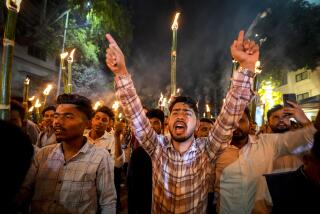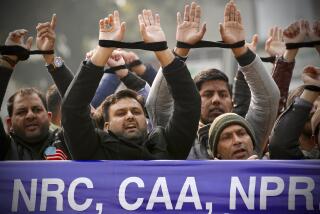Non-Muslims in Pakistan Seek a Political Voice
LAHORE, Pakistan — The Christmas tree festooned with lights and tinsel still stands in Cecil Chaudry’s living room, a cluster of unwrapped presents at its base. He knows, of course, that most other Christians in this Islamic republic have already taken down their trees, but he has dawdled, preferring to keep the spirit of the season alive.
Besides, he has been busy. A retired air force general and highly decorated veteran of two wars against India, Chaudry is at the forefront of a challenge to change the soul of Pakistan. He wants to end what he calls the “religious apartheid” that was written into the constitution in the 1980s and has given an unrepresentative voice to the heavy-handed tactics of an extremist Islamic minority.
Chaudry is one of at least 1 million Pakistani Christians, the country’s largest non-Muslim minority. Lahore’s cathedral is full for Sunday Mass, and Catholics worship there without fear of persecution. But the day he was passed over for promotion in the air force--because, he believes, he is Christian--he left to fight a new battle.
At the heart of grievances Christians and Hindus have is the “separate electorate” amendment that Gen. Zia ul-Haq, the late military ruler, wrote into the constitution. It takes religious minorities out of the political and social mainstream and represents one of many attempts by former dictators to manipulate for personal political power the one force without which Pakistan wouldn’t have existed--Islam.
Population Is Divided Into Five Groups
The law divides Pakistan’s 140 million people into five groups: Muslims, Christians, Hindus, Ahmadis (an Islamic sect whose members are viewed as apostates and thus non-Muslims) and other, smaller religions. Pakistan is about 97% Muslim. Each group votes separately and is represented by candidates of similar faith.
Muslim politicians have local constituencies; non-Muslims do not. The latter are elected at large as national representatives and often represent Hindus or Christians many hundreds of miles away. The 217-seat parliament guarantees 207 seats for Muslims, 10 for non-Muslims.
“This is the problem in Pakistan--the state has legislated against minorities,” Chaudry said. “This has led to sectarianism and laws that are then grossly abused by the religious extremists. The laws have created a wall that divides people and makes religion part of politics. It means we live in groups. Eventually, I am sure, we can end this system, but it will take time.”
Chaudry and his supporters collected 200,000 signatures in 40 days last summer, asking President Pervez Musharraf, who suspended the constitution after coming to power in a 1999 coup, to scrap the “separate electorate” system in favor of “joint electorate.” When Musharraf refused, most Christians and Hindus boycotted local elections last August.
Death threats notwithstanding, Chaudry continues to lobby for religious tolerance, if not secularism, aware that Muslim zealots consider it un-Islamic to kill a national hero who has fought for his Islamic homeland.
For a campaign of this sort, Lahore, Pakistan’s second-largest city, is the perfect battlefield. It is the cultural and educational center of Pakistan and, in many ways, the country’s political nerve center. It is a hotbed of debate and conflict between extremists and moderates. When people take to the streets in Lahore, residents like to say, governments change.
“Through the 1970s, this was a very moderate Islamic country,” said Kamila Hyat, 33, joint director of Pakistan’s feisty, independent Human Rights Commission, which has its national headquarters here. “My generation didn’t know discrimination against any group. We were all just Pakistanis. But since the ‘80s, religion--rather than becoming less important as it has in many societies--has become more important.”
Nation Undergoing ‘Talibanization’
In its report for 2000, the most recent available, the commission lists 315 women who were victims of so-called honor killings for being unfaithful to Islam, the vandalization of at least five Hindu temples, plus rapes and other crimes that authorities failed to investigate when they learned that the victims were Christian. Musharraf said Saturday that 400 people were killed last year in sectarian violence.
The strife is testimony to how far Pakistan has moved from the vision of its founding father, Mohammed Ali Jinnah, who studied law in England, was married to a non-Muslim and created a state that was secular, tolerant and moderate.
The incremental steps toward the “Talibanization” of Pakistan have subjugated the timid majority that still believes in the Jinnah principles to the zealous minority that has never shown strength in elections or attracted vast crowds at rallies.
In 1956, Pakistan became an Islamic republic. Bars and nightclubs were closed and alcohol banned. In the 1980s, Islamic law, Sharia, was imposed, including amputations for thieves and stoning to death for adulteresses. The penalty for blaspheming the prophet Muhammad was death. The harsh penalties have not been carried out, nor have blasphemous infidels been executed, but religious parties continue to agitate for Sharia’s enforcement.
Ironically, many Pakistanis are now hopeful that another military dictator will turn the country back toward Jinnah’s vision.
Gen. Musharraf started moving against religious extremists a month before the Sept. 11 terrorist attacks on the United States. Since then, Musharraf, a secular man, has continued his crackdown and spoken of the need to make Pakistan a country viewed by the world as a decent and responsible place. Thus far, the religious parties have been uncharacteristically acquiescent.
“People used to think that if we acted against the militants, there would be mayhem and violence,” Hyat said. “But sometimes when a bully gets punched in the nose, he runs away and you discover he doesn’t have the strength you thought he did. For the first time, the religious militants don’t have the backing of the establishment, and it was that backing that gave them the strength to destabilize governments.”
More to Read
Sign up for Essential California
The most important California stories and recommendations in your inbox every morning.
You may occasionally receive promotional content from the Los Angeles Times.










